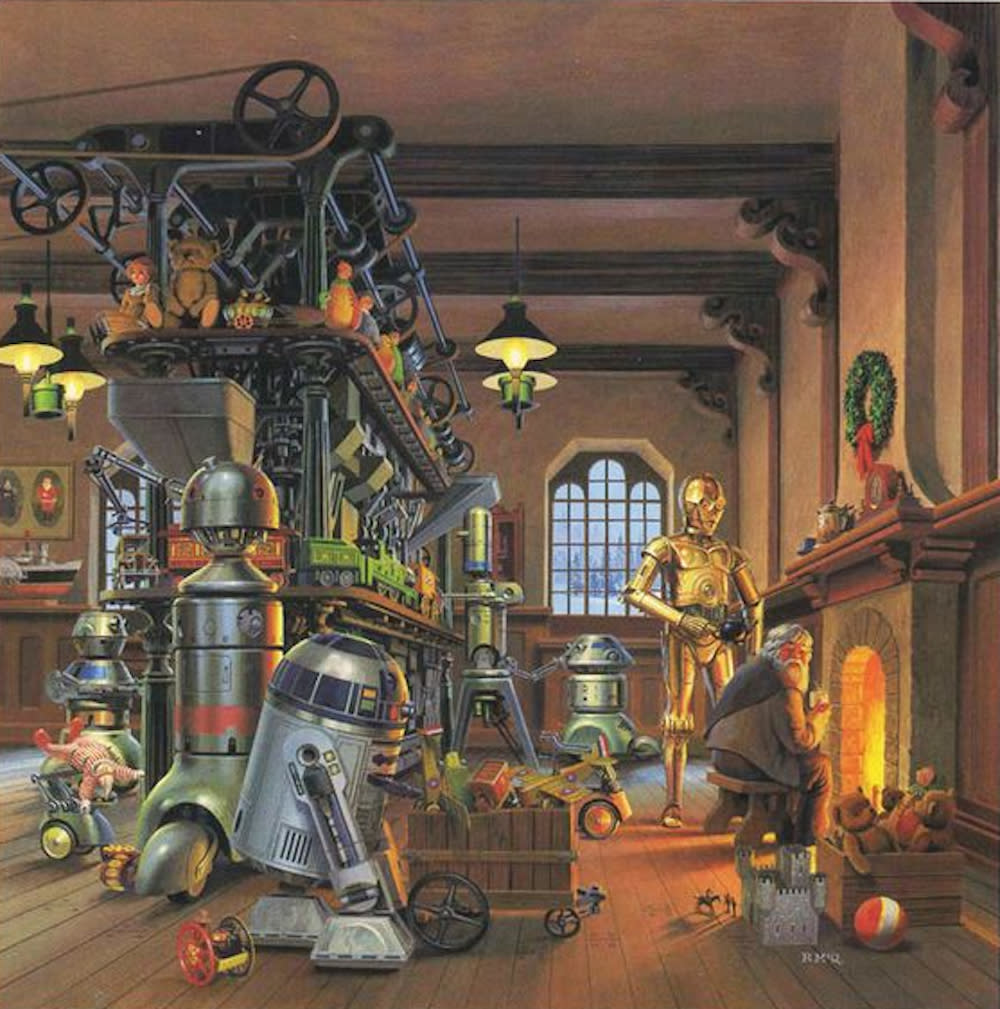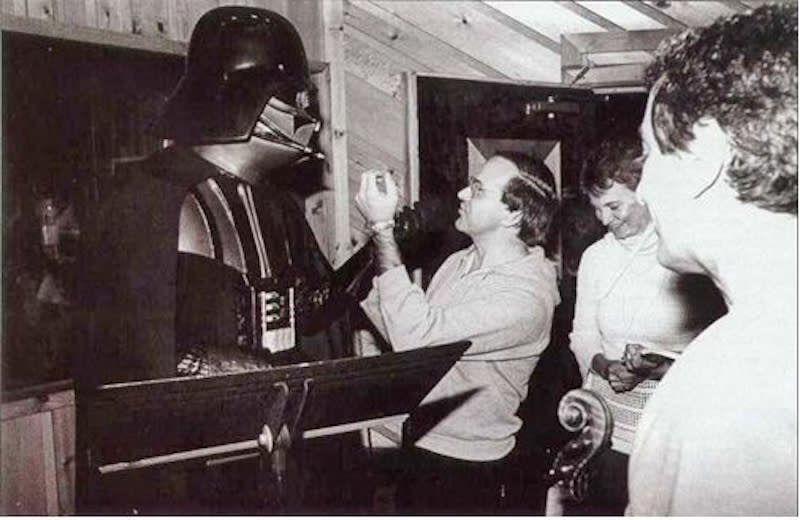The secret history of 'Christmas in the Stars,' the bonkers 'Star Wars' holiday album co-starring Jon Bon Jovi

Forty years ago, Meco Monardo’s disco version of the Star Wars theme song was a smash hit, outselling the original John Williams soundtrack and allowing the trombone-playing music producer to carve out his own lucrative niche in the recording industry covering sci-fi movie scores. By 1980, “disco was dying,” as Meco explained to Yahoo Entertainment during a 2015 interview, but he still had Star Wars fever. His version of The Empire Strikes Back’s “Imperial March,” featuring more of a rock ’n’ roll vibe, had just peaked at No. 18.
Bolstered by his latest Star Wars-related smash, the never-shy Monardo decided to swing for the fences. “I wrote a letter — I think it was nine pages long — to George Lucas,” the producer recounted. “I said, ‘You don’t know me,’ and then I explained about all the Star Wars music I did. … I said, ‘Why don’t we do a Christmas album together?’
“Then I had the only phone call I ever had with George Lucas,” said Monardo. “I did most of the talking, but he told me some ideas, and what we could use.” And did Lucas deliver. The filmmaker allowed official droid, Wookiee, blaster, and starship sound effects created by Lucasfilm’s Ben Burtt to be used, flew in Anthony Daniels to “sing” C-3PO’s songs, and provided cover art painted by Oscar-winning designer Ralph McQuarrie. Lucas even dispatched Darth Vader — at least a guy in a Darth Vader costume — to a recording session at New York’s Power Station, the state-of-the-art recording facility Meco’s partner, Tony Bongiovi, built with his share of proceeds from Meco’s original Star Wars single. “I realized that George Lucas had sent Darth Vader to make sure everything was going right,” quipped Meco.

“We were in good favor with George Lucas, because there’s royalties that get paid to John Williams and George Lucas and all those other people,” Bongiovi recounted to the CBC in 2014. Bongiovi also explained that that they could have had access to stars Mark Hamill, Carrie Fisher, and Harrison Ford but “they’re not singers, so they don’t fit on a record album” (something the infamous Star Wars Holiday Special proved two years earlier). The producers did want to bring in Frank Oz to croon a song called “The Meaning of Christmas” as Yoda, but he was tied up filming The Great Muppet Caper.
Unlike his previous cover-heavy albums, Meco started from scratch with the music. He and Bongiovi needed Star Wars-themed Christmas songs and they needed them fast, but they weren’t having much luck with the songwriters they approached. Enter a struggling composer named Maury Yeston, who was trying to put together the musical that would become Nine and could use some extra cash. “I met with Meco and I said, ‘Look, this may sound ridiculous to you, but if you want to do a Star Wars Christmas album you have to have a story,” Yeston told the CBC. “This is obviously Christmas in the world of Star Wars, which means this is in a galaxy far, far away, thousands of years ago. It’s not now. So call it Christmas in the Stars.” Meco was sold on the idea of the album having a through-line and recruited Yeston.
Yeston, who would go on to win a Tony Award for Nine and eventually write the smash Broadway musicals Titanic and Grand Hotel, cranked out nearly 20 Yule-appropriate tunes, nine of which made the final lineup. “The Meaning of Christmas,” minus Yoda, was radically retooled from the original version because Lucas didn’t want any of the traditional, religious-themed lyrics to be associated with the Force. It established the story of the album, set in a factory where droids make gifts for one “S. Claus.”
Other tracks included the Daniels-warbled title cut…
and “What Can You Get a Wookiee for Christmas (When He Already Owns a Comb?),” which was released as a single and reached No. 69 on the charts.
Then there was the ditty “R2-D2, We Wish You a Merry Christmas,” which marked the inauspicious debut of Bongiovi’s teenage cousin, a wannabe singer named John Francis Bonjiovi Jr.
“He was sweeping the floors, and his cousin Tony said he could sing,” Monardo said of the artist who would soon rebrand himself as Jon Bon Jovi. “But he denied it forever and forever.” Bon Jovi reluctantly came clean to Forbes a few years ago. “[Meco] needed a kid,” the rocker admitted. “So he said, ‘Can you really sing?’ I said, ‘Yeah,’ and he said, ‘Do it.’ So they wrote me down like a session musician. … It took 20 minutes, there was nothing to it.” Bon Jovi got $180 for his first professional recording, fronting a kid chorus four years before his namesake band would have a breakout hit with “Runaway.” (That’s the adolescent Bon Jovi on the solo vocals beginning at the 45-second mark below).
Meco’s label, RSO, anticipated a huge demand for Christmas in the Stars and pressed a stunning 150,000 initial copies in November 1980. But the company had serious fiscal issues and was abruptly shuttered (“[record company owner] Robert Stigwood was screwing the Bee Gees out of money,” Meco claims), meaning there was virtually no promotion for the album. The closure also prevented a second pressing that would have featured a tweaked cover crediting Lucas as a co-producer at the request of the filmmaker, who, according to Meco, “liked the record.”
In the decades since, the album has been reissued on CD and is still available via online music services, but it has never achieved the heavy rotation of other novelty holiday releases. Christmas in the Stars might not have been the hit its creative team was looking for, but with Star Wars back in the public consciousness, now is the perfect time to revisit a Jedi jingle or two.
Editor’s note: This story was excerpted from “The Wild Story of Disco Star Wars: How the Universe Aligned to Create Meco’s Masterpieces,” published in 2015.
Watch Harrison Ford and Carrie Fisher discuss the Star Wars Holiday Special and how it could be rebooted today:
Read more from Yahoo Entertainment:

